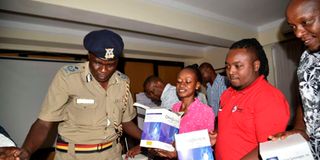Concern as hospitals run out of HIV testing kits

The then Mombasa Police Commander Johnstone Ipara receives boxes of HIV self-testing kits donated by Kenya Medical Research Institute (Kemri) during a sensitization programme for the Police on May 17, 2019.
Public health facilities across the country have reported severe shortages of HIV rapid testing kits, leaving the country with incomplete data as new cases could be going unreported.
Some of the counties that have reported acute shortage since last month are Homa Bay, Kisumu, Mombasa, Uasin Gishu, Siaya Bomet, Kilifi and Kwale.
In Homa Bay and Kilifi, for instance, HIV prevention is also being hampered by unavailability of free condoms that are normally placed in public places like bars and higher learning institutions.
Homa Bay County Director of Preventive and Promotive Health Adel Ottoman said the shortage of testing kits has jeopardised data collection on new infection, thus derailing the gains made in the sector. He said the Health department has not been in a position to record any new cases for the past six months
“The shortage has in the long run compromised the interventions by the government to reduce the infection rates among youths and sexually active adolescents,” Dr Ottoman said.
He argued that by using the self-test kits, residents may fail to check with the facilities in case they test positive. This situation has also had an impact on antiretroviral uptake for the new cases reported in the county, which is among those burdened by the viral infection with a prevalence of 20 per cent, four times the national average.
The national prevalence is 4.8 per cent, according to the National Syndemic Diseases Control Council, the successor to the National Aids Control Council.
“HIV tests are conducted in a series of tests, when one of the kits is not available, the entire test must be suspended to avoid inaccuracies,” said Dr Ottoman.
In Siaya, one officer at the public health office told Sunday Nation that the last time they did outreach at the county level was in March and since then, they have not distributed any kits or condoms to facilities.
“’I don’t know whether the kits are in store or not, but most public hospitals are not having them and again why would they be kept in the stores? People are really asking for the kits,” says the officer, who is not authorised to speak to the media, adding that it is not just the test kits alone but reagents are also not available.
Ms Fatuma Mboki, a community health worker in Kwale, said they have not been testing people. “What we normally do during our community visits, we test people for various diseases, including malaria and even HIV, then refer them in case of any positive outcome, but for the last four months, we have not been supplied with the HIV kits, we were told that they have been ordered from Kemsa,” she said.
However, in some chemists, the self-testing HIV kits are available but sold at Sh500, putting them out of reach for poor Kenyans.
At the Homa Bay County Teaching and Referral Hospital, residents seeking tests are referred to private clinics to buy the kits and confirm their status at home.
An officer from Liverpool VCT, which runs HIV counselling and testing at the hospital, said the outcome of the tests conducted outside the health facility is not recorded anywhere.
Hospital chief executive officer Peter Ogolla said the crisis has had a great impact at the maternity clinics where the risk of a HIV-positive mother infecting a newborn is high. The hospital has resorted to using Elisa, a laboratory test used on those exposed to viruses with the cost ranging from Sh5,000 to Sh10,000 for the test and only a few hospitals have the equipment.
Mr Peter Gwengi, the director of Lake Victoria Initiative for People Living with HIV, said most children and adults are not being tested for HIV. “No reagents, that’s the song of the day in most facilities, with hospital administrators asking those who want to be tested to come the following day,” says Mr Gwengi, who has been living with the virus for 30 years.
In February, the country reported another shortage.
According to the National Aids and STI Control Programme manager Lazarus Momanyi, the acute shortage that hit the entire country was due to delays by the testing kits supplier. He has, however, assured that an order had been made to the Kenya Medical Supplies Authorities (Kemsa) two weeks ago and the kits should be available in the facilities soon.
“There was a national stock-out of the kits affecting the public facilities, but the situation has been handled, the dispatch is currently with Kemsa,” he said.
He regretted that the delay may have put infected individuals, especially children, at a higher risk of severe infection. “The delayed test can only mean that the facilities are not able to identify the new infection or place them on ARVS, exposing those to opportunistic diseases and untimely deaths,” said Dr Momanyi.
By Angela Oketch, George Odiwuor, Angeline Ochieng





